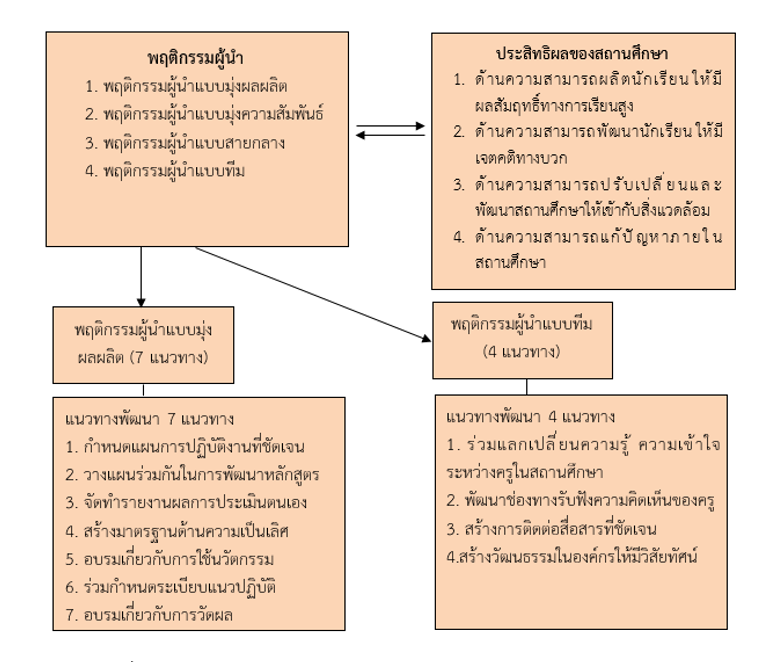GUIDELINES FOR DEVELOPING THE LEADERSHIP BEHAVIOR OF THE SCHOOL ADMINISTRATORS AFFECTING THE EFFECTIVENESS OF SCHOOLS UNDER MAHASARAKHAM PRIMARY EDUCATIONAL SERVICE AREA OFFICE 1
Main Article Content
Abstract
The purposes of this study were : 1) to examine the leadership behavior of school administrators, 2) study at effectiveness of schools, 3) to find out a relation between the leadership behavior of school administrators and effectiveness of schools and 4) to develop guidelines for developing the leadership behavior of school administrators affecting the effectiveness of schools under Mahasarakham Primary Educational Service Area Office 1 2. The research method was divided into 2 phases. The first phase studied current conditions and a relation between the leadership behavior of school administrators and effectiveness of schools. The samples were 291 teachers. The research tools was a rating scale questionnaire. The second phase was a developing guideline to encouraged the leadership behavior of school administrators affecting the effectiveness of schools. The development guideline was evaluated by 5 experts, selected from purposive sampling technique. The research tools were used in the study were an interview from and appropriateness and feasibility of the guideline. Percentage, mean, standard deviation and a relation between the leadership behavior of school administrators and effectiveness of schools synthesis by Pearson’s Product Moment Correlation Coefficient were the parameters used for statistical analysis.
The results indicates that:1)The overall of leadership behavior in school administrators under Mahasarakham Primary Educational Service Area Office 1 was found to be at the high level as follow : the productivity attentive behavior, the relationship attentive behavior and team working attentive behavior.2) The overall of the effectiveness in schools under Mahasarakham Primary Educational Service Area Office 1 was found to be at the high level as followed : The ability to develop students to get high learning achievement, The ability to develop students to be positive attitude, the efficiency in modification and development schools and the efficiency in solving school problems.3) The relationship between the leadership behavior of school administrators and effectiveness of schools was statistically significant at .01 level.4)guidelines for developing the leadership behavior of school administrators affecting the effectiveness of schools under Mahasarakham Primary Educational Service Area Office 1 can be include 3 parts ; 1) the 7 guidelines of productivity attentive behavior part and 2) The 4 guidelines team working attentive behavior part All 11 guidelines were appropriateness and feasibility of the guidelines at the high level.
Article Details

This work is licensed under a Creative Commons Attribution-NonCommercial-NoDerivatives 4.0 International License.
References
กนกอร สมปราชญ์. (2560). ภาวะผู้นำและภาวะผู้นำการเรียนรู้สำหรับผู้บริหารสถานศึกษา.ขอนแก่น : คลังนานาวิทยา.
ขวัญใจ เกตุอุดม. (2554). การศึกษาความสัมพันธ์ระหว่างพฤติกรรมผู้นำของผู้บริหารสถานศึกษากับประสิทธิผลของโรงเรียน สังกัดองค์การบริหารส่วนจังหวัดชลบุรี. วิทยานิพนธ์ครุศาสตรมหาบัณฑิต สาขาวิชาการบริหารการศึกษา. บัณฑิตวิทยาลัย : มหาวิทยาลัยราชภัฏราชนครินทร์.
จอมพงศ์ มงคลวนิช. (2555). การบริหารองค์การและบุคลากรทางการศึกษา. กรุงเทพมหานคร : วี. พริ้นท์.
จันจิรา เขียวคล้าย. (2559). การศึกษาความสัมพันธ์ระหว่างพฤติกรรมการบริหารของผู้บริหารสถานศึกษากับประสิทธิผลของโรงเรียน สังกัดสำนักงานเขตพื้นที่การศึกษามัธยมศึกษาเขต 11 ในจังหวัดสุราษฎร์ธานี. วิทยานิพนธ์ครุศาสตรมหาบัณฑิต สาขาวิชาการบริหารการศึกษา. บัณฑิตวิทยาลัย : มหาวิทยาลัยราชภัฏสุราษฎร์ธานี.
ธนิต ทองอาจ. (2553). ภาวะผู้นำการเปลี่ยนแปลงของผู้บริหารที่ส่งผลต่อประสิทธิผลของโรงเรียนในสังกัดสำนักงานเขตพื้นที่การศึกษาจังหวัดมุกดาหาร. วิทยานิพนธ์ศึกษาศาสตรมหาบัณฑิต สาขาบริหารการศึกษา. บัณฑิตวิทยาลัย : มหาวิทยาลัยศิลปากร.
ธีรดา สืบวงษ์ชัย. (2553). ความสัมพันธ์ระหว่างภาวะผู้นำของผู้บริหารสถนศึกษากับความพึงพอใจในการปฏิบัติงานของครูในสถานศึกษาสังกัดสำนักงานเขตพื้นที่การศึกษาจันทบุรี เขต 2. วิทยานิพนธ์ครุศาสตรมหาบัณฑิต สาขาการบริหารการศึกษา. บัณฑิตวิทยาลัย : มหาวิทยาลัยราชภัฏรำไพพรรณี จันทบุรี.
บรรณสรณ์ นรดี. (2563). ความสัมพันธ์ระหว่างภาวะผู้นำเชิงพฤติกรรมของผู้บริหารสถานศึกษาและแรงจูงใจในการปฏิบัติงานของครูในกลุ่มพัฒนาคุณภาพการศึกษาโคกเพชรดองกำเม็ด สำนักงานเขตพื้นที่การศึกษาประถมศึกษาศรีสะเกษ เขต 3. วารสารนวัตกรรมการศึกษาและการวิจัย. 4(3). 305-317.
เบ็ญจมาศ หนูไชยทอง. (2561). ความสัมพันธ์ระหว่างภาวะผู้นำเชิงสร้างสรรค์ของผู้บริหารสถานศึกษากับประสิทธิผลของโรงเรียนตามความคิดเห็นของครู สังกัดสำนักงานเขตพื้นที่การศึกษาประถมศึกษาสุราษฎร์ธานี เขต 1. วิทยานิพนธ์ปริญญาครุศาสตรมหาบัณฑิต สาขาวิชาการบริหารการศึกษา. บัณฑิตวิทยาลัย : มหาวิทยาลัยราชภัฏสุราษฎร์ธานี.
สำนักงานเขตพื้นที่การศึกษาประถมศึกษามหาสารคาม เขต 1. (2563). แผนปฏิบัติการประจำปีงบประมาณ พ.ศ. 2563. มหาสารคาม : กลุ่มนโยบายและแผน.
สำราญ แสงจันทร์. (2551). ศึกษาพฤติกรรมผู้นำของผู้อำนวยการสถานศึกษาตามความต้องการของครูอำเภอนาทวี ลังกัดสำนักงานเขตพื้นที่การศึกษาสงขลา เขต 3. วิทยานิพนธ์การศึกษามหาบัณฑิต สาขาวิชาการบริหารการศึกษา. บัณฑิตวิทยาลัย : มหาวิทยาลัยทักษิณ.
สุนทร โคตรบรรเทา. (2551). ภาวะผู้นำในองค์การการศึกษา. กรุงเทพมหานคร : ปัญญาชน.
อรพรรณ ตู้จินดา. (2558). ประสิทธิผลของการบริหารสถานศึกษาวัดปทุมวนารามโดยใช้อรพรรณโมเดล. Silpakorn Educational Research Journal. 7(1). 42-56.
Hersey, P. and Blanchard, K H. (1988). Management of Organizational Behavior! Utilizing Human Resources. New Delhi : Prentice Hall of India.
Robbins, S. P. (2005). Organizational Behavior: Concepts, Controversies, and Applications. Englewood Cliffs, New Jersey : Prentice Hall.
Russell, R. and Stone, G. A. (2002). A Review of Servant Leadership Attributes: Developing a Practical Model. Leadership & Organization Development Journal. 23(3). 145 - 157.


